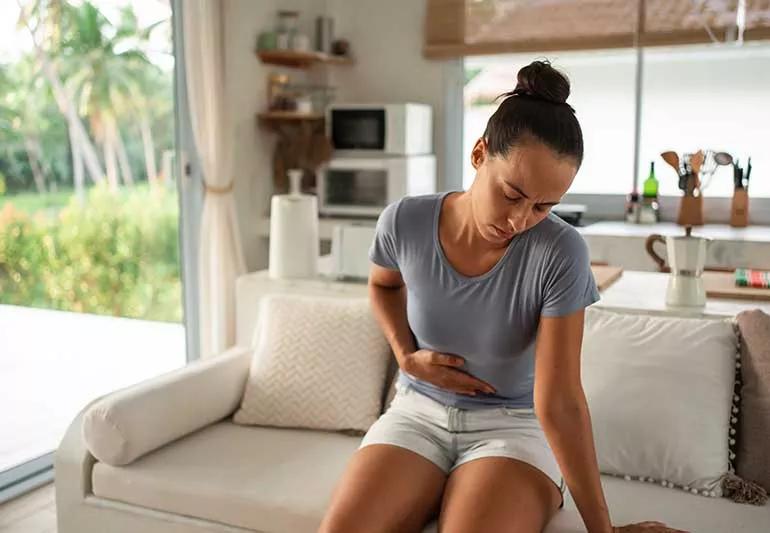Depending on size and location, they can affect your rectum, stomach, bladder and kidneys

Image content: This image is available to view online.
View image online (https://assets.clevelandclinic.org/transform/84af90a6-c6c5-4c35-80e2-7715a478b4de/Uterine-Fibroids-GI-Problems-1468775991-770x533-1_jpg)
woman holding lower abdomen in discomfort
If you have uterine fibroids, you’re already dealing with pelvic pain, discomfort and bleeding between your periods.
Advertisement
Cleveland Clinic is a non-profit academic medical center. Advertising on our site helps support our mission. We do not endorse non-Cleveland Clinic products or services. Policy
Uterine fibroids are noncancerous growths in your uterus that affect about 40% to 80% of women and those assigned female at birth (AFAB). Risk factors like a higher body weight, not having children and a family history of fibroids can increase your chances of getting uterine fibroids. And in addition to pelvic pain and bleeding between your periods, there are other symptoms you may experience, like lower back pain and fatigue.
But can uterine fibroids cause digestive problems, too?
Depending on the size and location of your uterine fibroids, yes — they can affect other organs like your rectum, stomach, bladder and kidneys. This can cause symptoms like constipation and frequent urination.
Ob/Gyn Lindsey Valentine, MD, explains how uterine fibroids can cause digestive issues, and when you should see a healthcare provider.
Yes, reiterates Dr. Valentine. Like the popular real estate mantra “location, location, location,” where your uterine fibroids settle down can impact what kind of symptoms you have.
“Depending on where the fibroids are located and how big they are, they can put pressure on the other organs,” she explains. “Most of the GI [gastrointestinal] symptoms are due to the pressure of the fibroids pushing on your bowels.”
Advertisement
If a uterine fibroid is extremely large and extends out of your pelvis toward your upper abdomen, this can cause bloating or pressure on your stomach. Fortunately, this isn’t common.
“You may have a feeling of early satiety or that feeling of fullness,” notes Dr. Valentine.
This can lead to unintended weight loss. And on the flip side, if your uterine fibroid becomes large enough, the area can expand, making it look like you’re pregnant.
The location of some uterine fibroids can cause bowel problems like constipation.
“If a uterine fibroid is pressing on the organs especially lower in the pelvis, they could cause constipation or difficulty emptying your bowels,” explains Dr. Valentine.
And over time, being constipated can cause hemorrhoids.
“This can happen indirectly,” she continues. “If a uterine fibroid is pressing on your colon or rectum, and you’re straining to use the bathroom, that could lead to hemorrhoids over time.”
Though very rare, a uterine fibroid can also affect your kidneys.
“In situations where a uterine fibroid is very large, it could push on your ureter and cause urine to back up in your kidney,” she notes. “This can cause your kidney to swell, which is a condition known as hydronephrosis.”
You don’t have to cope with your uterine fibroids all alone — or any kind of pain for that matter.
If you’ve been experiencing stomach or bowel issues, there’s a chance it could be due to uterine fibroids and you may not even know it. Most uterine fibroids don’t cause any symptoms until they become larger in size.
“If you have symptoms that are persistent or are worsening without any known cause, you should see a doctor for further evaluation,” Dr. Valentine advises. “One of the tough things about these symptoms is that they’re not specific to uterine fibroids, so there’s a lot of things that could cause them.”
Your healthcare provider will listen to your symptoms and do an evaluation. They may even run some tests like an ultrasonography, magnetic resonance imaging (MRI) or computed tomography (CT) to determine the cause.
If it’s uterine fibroids, various treatments are available, including medication or even surgery. It’s important to listen to your body, and if you start experiencing stomach or bowel issues, don’t hesitate to talk to a doctor. There is help for your uterine fibroids pain.
“Remember: Not all uterine fibroids require treatments,” reassures Dr. Valentine. “It’s really geared towards treating your symptoms.”
Advertisement

Delivered every Tuesday!
Sign up for our Health Essentials emails for expert guidance on nutrition, fitness, sleep, skin care and more
Learn more about our editorial process.
Advertisement
Eating more fruits and veggies and less red meat could help prevent or shrink fibroids
Mild symptoms may be manageable, but severe bleeding, pain and depression demand treatment
How uterine fibroids can change with your body
If you’re living through fatigue due to fibroids, there are ways to cope
The Short Answer from an OB/Gyn
Treatments can help, besides a hysterectomy
Your gut never really stops working — and that’s not even the most incredible thing about it
Depending on their size, these noncancerous growths can create an abdominal bulge
Type 2 diabetes isn’t inevitable with these dietary changes
Applying a hot or cold compress can help with pain
Pump up your iron intake with foods like tuna, tofu and turkey